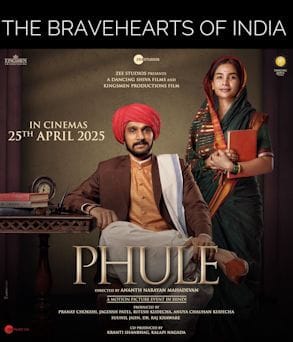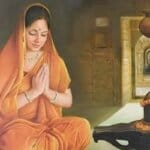“Phule,” helmed by seasoned director Anant Mahadevan, is a biographical Hindi film that honors two of India’s leading 19th-century reformers—Jyotirao Phule and Savitribai Phule.
Premiering on April 25, 2025, the film features Pratik Gandhi and Patralekhaa in prominent roles, aiming to highlight the struggles and accomplishments of the Phule couple through the medium of cinema.
Plot Overview: A Path of Social Enlightenment
The narrative centers on the life of Jyotirao Phule, a young man who bravely challenges the entrenched caste system and gender inequality during colonial India.
With the encouragement of his wife, Savitribai, he establishes the first school for girls and children from “lower” castes in Pune.
The couple’s relentless fight against Brahminical orthodoxy, child marriage, exploitation of widows, and untouchability serves as the foundation of this compelling tale.

Historical Importance: The Authentic Jyotirao and Savitribai Phule
Jyotiba and Savitribai Phule were pioneers of India’s social justice movement.
The film chronicles their transformation from a newlywed couple to groundbreaking intellectuals.
Jyotiba, the son of a farmer, took a stand against age-old caste customs, while Savitribai, recognized as India’s first female teacher, battled against patriarchy and societal misogyny.
Their contributions to education, women’s rights, and social equity set the stage for later reformers like Dr. B.R. Ambedkar.
Casting and Performances: Pratik Gandhi and Patralekhaa Excel
Pratik Gandhi, famed for his role in Scam 1992, embodies Jyotirao Phule with exceptional finesse.
His performance encapsulates the idealism, discontent, and intellect of a reformer grappling with a profoundly unjust society.
Patralekhaa’s portrayal of Savitribai is spirited and deeply resonant.
She commands the screen in pivotal moments that showcase Savitribai’s challenges in becoming a teacher and public figure.
Their dynamic illustrates a partnership that is both romantic and revolutionary—an aspect rarely depicted in Indian period dramas.

Direction and Screenplay: A Respectful Yet Restrained Approach
Anant Mahadevan, recognized for his focus on socially relevant films, treats Phule with significant respect.
The narrative is straightforward and at times instructive, which keeps it aligned with historical facts but limits the dramatic tension.
Although the screenplay is factual and educational, it lacks the dynamic energy required to fully engage the audience throughout its 129-minute duration.
Cinematography: Visuals That Capture the Period
Sunita Radia’s cinematography merits recognition for establishing an authentic period feel.
The film employs natural light, earthy hues, and minimalist set designs to portray 19th-century Maharashtra.
Scenes set in classrooms, protest venues, and rural lanes are carefully framed, visually embodying the fight against both colonial and caste oppression.
Music and Sound Design: Soulful Yet Subtle
The score created by Rohan-Rohan is purposefully restrained, aligning with the film’s overall tone.
Tracks like Saathi and Dhun Lagi serve as emotional links within the story without overwhelming it.
The background music enriches the dialogues and amplifies the scenes of protest, personal grief, and social triumph, while traditional instruments contribute a layer of cultural richness.
Editing and Pacing: A Mixed Outcome
Edited by Raunak Phadnis, the film experiences some challenges with pacing.
While the initial half builds suspense and presents the protagonists’ struggles, the latter portion transitions into a more documentary style, feeling less dramatic.
Some sequences linger longer than necessary, and a more concise edit could have improved the emotional flow.
Themes and Symbolism: Education, Resistance, and Equality
The film delves into essential themes such as access to education, the liberation of women, the abolition of caste, and marital partnership as a form of activism.
The chalkboard serves as a recurring emblem for knowledge, freedom, and transformation.
A particularly impactful moment features Savitribai being attacked with cow dung as she approaches the school, yet she continues her stride with dignity—an act of daily resistance that epitomizes the couple’s resilience.
Supporting Cast and Character Development
In addition to the main duo, the supporting cast provides commendable performances.
Actors portraying the Phules’ allies and adversaries—upper caste landlords, colonial officials, orthodox Brahmins, and fellow reform activists—enhance the storyline.
However, some characters, particularly Jyotirao’s companions and supporters, could be further developed.
Dialogues and Language: Genuine and Poetic
Most dialogues are in formal Hindi, sprinkled with elements of Marathi, providing an authentic touch to the narrative.
The exchanges between the Phules are crafted with thoughtfulness, showcasing both affection and ideological commitment.
Quotes from Phule’s writings are woven in, offering a glimpse into his revolutionary ideas.
Reception and Public Response
Critically, Phule has garnered moderate acclaim:
Times of India (3.5/5): Characterized it as a “stirring tribute” and praised Pratik Gandhi’s performance.
NDTV (3.5/5): Valued the film’s integrity and subtlety.
Hindustan Times: Commended the intent but criticized the screenplay for its monotony.
Bollywood Hungama (2/5): Pointed out the weak writing and uninspired direction.
Public response has been polarized.
While advocates for social reform and educators have applauded the film, mainstream viewers have found it slow-paced.
Box Office and Distribution
Distributed by Zee Studios, Phule had a modest theatrical debut.
Its box office performance has been average, with greater interest anticipated through educational screenings and OTT platforms in the future.
It has been particularly promoted in Maharashtra, Gujarat, and educational settings.
Also check: Raid 2 (2025) Movie Review
Conclusion: An Educative Cinematic Homage
Phule may not achieve commercial success, but it remains a significant cinematic account of India’s history.
With compelling performances, historical accuracy, and a message that resonates with today’s socio-political landscape, it acts both as a biography and an invitation for reflection.
It is recommended for anyone interested in Indian reform movements, education, and social justice.
Film Information (Quick Facts)
Title: Phule
Director: Anant Mahadevan
Written by: Anant Mahadevan
Produced by: Sunil Jain, Pranay Chokshi, Ritesh Kudecha, Anuya Chauhan Kudecha, Dr. Raj Khaware
Starring: Pratik Gandhi, Patralekhaa
Music: Rohan-Rohan
Cinematography: Sunita Radia
Editing: Raunak Phadnis
Production: Dancing Shiva Films, Kingsmen Productions
Distributed by: Zee Studios
Release Date: 25 April 2025
Running Time: 129 minutes
Language: Hindi
Country: India
What did you think of Phule? Share your views in the comments below—we’d love to hear your thoughts on this powerful biopic!








